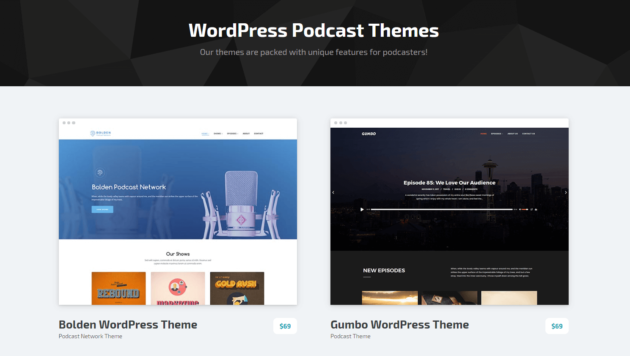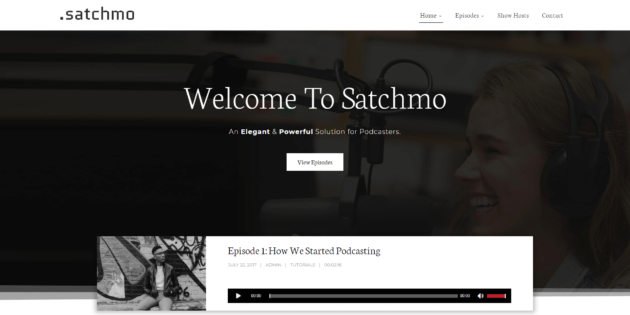
Podcasting has become a hugely popular industry. This means if you want to build a significant audience for your own podcast, you’ll need to do some groundwork. This usually includes setting up a dedicated website.
While you may already share your podcast episodes on a site like SoundCloud or iTunes, a website gives you much greater reach. Plus, along with featuring the podcast itself, you can provide information about your company or organization, share valuable resources, and encourage your audience to purchase your products or sign up to a newsletter.
In this article, we’re going to talk about why you might want to create a WordPress website for your podcast. Then we’ll explain how you can make that site stand out using podcast-specific themes and plugins. Let’s jump right in!
Why Your Podcast Needs Its Own Website
Most podcasters focus on getting their episodes onto as many dedicated podcasting sites and apps as possible. This makes sense, as that’s where people will often go to find new content and creators:

However, only uploading your podcasts to these sites limits your potential for growth. Most provide a very little opportunity for promoting your episodes, as well as sharing more information about them (and you).
A website is the perfect solution. It can serve as a ‘home base’ for your podcast – a place where your audience can go to listen to episodes, find supporting content and resources, learn more about the people behind the voices, and so on.
With a dedicated podcasting website, you can also attract new listeners using simple Search Engine Optimization (SEO) techniques. In addition, if you sell products or want to encourage your audience to do something specific (such as sign up to an email list), you can include a prominent Call To Action (CTA) on your site.
WordPress: The Perfect Podcasting Solution
Of course, just throwing together a basic website without much thought involved won’t get you very far. If you want your site to be both visually appealing and easy to use, you’ll need to choose the right tools to build it with.
While there are a lot of solutions out there that you can use, we highly recommend WordPress:

This platform is free and open-source, so it won’t cost you anything to try it out. At the same time, it’s very powerful. WordPress can be used to create just about any type of website you can imagine, large or small.
There are a lot of benefits to using WordPress for your podcasting site. It’s easy to get started with, has a user-friendly dashboard you can use to customize your site and create content, and is very secure. Best of all, you can extend its functionality as much as you’d like using plugins and themes.
Plugins add new features to your site, and themes alter its appearance and layout. Both types of add-ons help you shape your site to fit your unique needs and goals. Plus, there are thousands of options available. You can even find plugins and themes designed specifically for podcasters.
The advantage of using these tools is that you’ll get access to advanced features, without the need to create custom code. In fact, they’re all you’ll really need to transform your WordPress site into a podcasting powerhouse. After setting up a basic WordPress website, therefore, your next step is to go looking for a theme that fits your needs.
How to Choose the Right Podcasting Theme for Your WordPress Site
Ultimately, the best thing you can do for your podcasting site is install one of the aforementioned dedicated themes. This will give your site the right look, and add much of the functionality you’ll need to showcase your podcasts effectively.
When it comes to podcasting themes, the first place you’ll want to visit is SecondLineThemes:

This developer only creates themes that are specifically for podcasters, which means they’re in tune with the unique requirements of the niche. Each of their four feature themes is essentially a complete solution for building a podcasting website.
For an example, you can check out the Satchmo theme:

This theme has a stylish and modern look, which will make your site look professional and compelling even if you have no design experience. Of course, you can customize the default look, adding your own colors, fonts, images, and so on.
If you really want to make things easy on yourself, you can use the supported Elementor Page Builder plugin to design your site and content. This plugin features a drag-and-drop interface that makes website design simple, even for novices.
Satchmo (like SecondLineTheme’s other offerings) also supports many key podcasting plugins. These include PowerPress and Seriously Simple Podcasting – tools that give you additional options for displaying your podcasts on your website.
Other key features of the Satchmo theme include:
- Support for both locally-hosted and external MP3 files, as well as embeds from SoundCloud and other podcasting sites.
- An episode slider that enables you to display your podcasts in a dynamic and attention-grabbing way.
- Lots of demo content to get you started, along with a one-click import feature.
- Optimization for both performance and SEO.
If you want to put together an effective podcasting website quickly, you can’t go wrong with Satchmo or one of the other options in the SecondLineThemes catalog. Each offers a live demo, so you can check it out in action.
While not the only way to build a home of your podcast, the combination of WordPress and the right theme means you’ll get access to all the customization options and functionality you’ll need. Plus, you won’t have to know a thing about website development.
Conclusion
While creating a website for your podcast takes a little extra work, it’s well worth the effort involved. Your listeners will appreciate having a central hub where they can check out both new and old episodes, learn more about you or your business, and maybe even interact with one another.
What’s more, putting this type of website together isn’t at all difficult. Using WordPress as your foundation will get you started on the right foot. Then you can shape your site into a home for your podcast, using themes and plugins designed specifically for that purpose. You’ll want to start with a fully-featured podcasting theme such as Satchmo, and then pick up a plugin or two to round out your site (such as PowerPress or Seriously Simple Podcasting).
Do you have any questions about how to create your podcast website using WordPress themes and plugins? Ask away in the comments section below!
Image credit: Pxhere.

0 comments:
Post a Comment